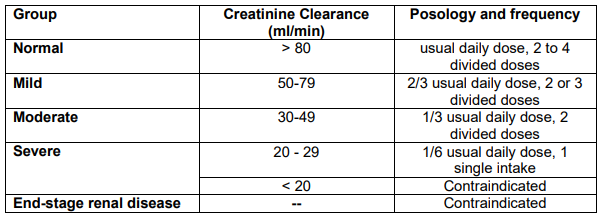Regulatory Information
HSA regulatory responsibility and product classification details
Regulatory Responsibility
Product Classification
Formulation Information
TABLET, FILM COATED
**DOSAGE AND ADMINISTRATION** _Oral formulations_ NOOTROPIL should be administered orally, and may be taken with or without food. The film-coated tablets should be swallowed with liquid. _Parenteral formulations_ When parenteral administration is needed (e.g. swallowing difficulties, unconsciousness) NOOTROPIL can be administered intravenously at the same recommended daily dose. **Route of Administration** _Oral formulations_ For oral use. _Parenteral formulations_ For intravenous use. The total daily dose can range from 30 to 160 mg/kg/day depending on the indication. This is administered twice daily, but may also be given in three or four separate doses. - When treating severe symptoms, 12 g daily may need to be administered as an intravenous infusion. - NOOTROPIL, as a long-term therapy for psycho-organic syndrome in the elderly is given in doses ranging from 1.2 to 2.4 g daily, according to the severity of the symptoms. The loading dose can be as high as 4.8 g/day during the initial weeks of treatment. - When treating sickle-cell vaso-occlusive crises, the dose administered is 160 mg/kg/day divided in four equal doses. - In the treatment of 8 to 13 year-old children with learning difficulties NOOTROPIL is given at a total dose of 3.3 g daily. This is administered either as 8 ml of a 20% solution twice a day i.e. before breakfast and before the evening meal. The medication may be more easily accepted if given in fruit juice, or in some other drink. Treatment should be continued throughout the school year. The efficacy of a longer period of treatment has not yet been investigated. **Elderly** Adjustment of the dose is recommended in elderly patients with compromised renal function ( _see Sections: Warnings and Precautions – please refer to the Product Insert/Patient Information Leaflet published on HSA for the full drug information; Renal Impairment below_). For long term treatment in the elderly, regular evaluation of the creatinine clearance is required to allow dosage adaptation if needed. **Renal impairment** Piracetam is contraindicated in severe renal impairment (renal creatinine clearance of less than 20 ml per minute) ( _see Sections: Contraindications; Warnings and Precautions_ – _please refer to the Product Insert/Patient Information Leaflet published on HSA for the full drug information_). The daily dose must be individualised according to renal function. Refer to the following table and adjust the dose as indicated. To use this dosing table, an estimate of the patient’s creatinine clearance (CLcr) in ml/min is needed. The CLcr in ml/min may be estimated from serum creatinine (mg/dl) determination using the following formula:   **Hepatic impairment** No dose adjustment is needed in patients with solely hepatic impairment. In patients with hepatic impairment and renal impairment, adjustment of dose is recommended ( _see dose adjustment in Renal Impairment above_).
ORAL
Medical Information
**INDICATIONS** 1. Studies carried out in the elderly suffering from loss of memory, vertigo, a lack of concentration or of alertness, changes of mood, a deterioration in behaviour and personal negligence, demonstrate an improvement in symptoms. These symptoms can also provide an early warning of the onset of pathological ageing such as Alzheimer’s Disease, an Alzheimer type of senile dementia, or the dementia produced by multiple cerebral infarcts. 2. NOOTROPIL is advocated in the treatment of sickle-cell vaso-occlusive crises. 3. Studies have shown some improvement in children with learning difficulties associated with the written word, particularly with textual understanding which cannot be explained by intellectual backwardness, inadequate education or by the family environment. The administration of NOOTROPIL does not replace other measures also well adapted to correct these learning difficulties, such as remedial teaching.
**CONTRAINDICATIONS** NOOTROPIL is contraindicated in: - Hypersensitivity to piracetam, other pyrrolidone derivatives or any of the excipients; - Patients with severe renal impairment (renal creatinine clearance of less than 20 ml per minute); - Patients with cerebral haemorrhage; - Patients suffering from Huntington's Chorea.
N06BX03
piracetam
Manufacturer Information
GLAXOSMITHKLINE PTE LTD
UCB Pharma SA
Active Ingredients
Documents
Package Inserts
Nootropil PI.pdf
Approved: July 6, 2017
